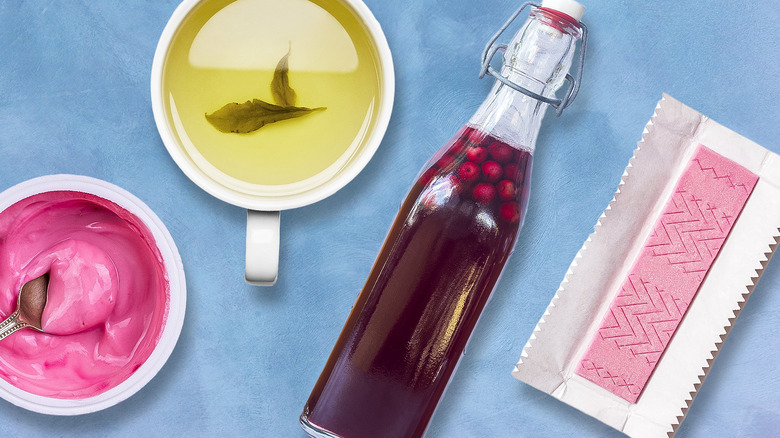11 Surprising Daily Items With Hidden Caffeine

The Hidden Sources of Caffeine in Everyday Foods and Drinks
Caffeine is a widely consumed stimulant that many people rely on to start their day. While coffee is the most obvious source, there are numerous other everyday items that contain caffeine, often without people realizing it. Understanding where this stimulant can be found is essential for those who want to manage their intake or avoid it altogether.
Snack Bars: A Surprising Source of Caffeine
Snack bars are convenient and often marketed as energy-boosting snacks. However, many of these products contain caffeine from ingredients like chocolate, guarana, matcha, and yerba mate. For example, some bars use green tea extract to provide an energy boost, while others, like Jesse's WAKE UP! bars, clearly state they contain the same amount of caffeine as three espresso shots. This makes them a potent source of caffeine, especially for those looking for a quick pick-me-up.
Kombucha: A Fizzy Drink with a Caffeine Kick
Kombucha, known for its probiotic benefits, is made by fermenting sweetened tea. Since tea naturally contains caffeine, kombucha also contains small amounts of this stimulant. However, the caffeine content is generally low, with one 250-milliliter can containing under 15 milligrams. This is significantly less than what you’d find in a cup of coffee. For those avoiding caffeine, alternatives like pineapple tepache or water kefir offer similar fizzy flavors without the stimulant.
Decaf Coffee: Not Completely Caffeine-Free
Decaf coffee is often seen as a safer alternative to regular coffee, but it’s not entirely free of caffeine. The decaffeination process removes about 97% of the caffeine, leaving around 7 milligrams per cup. This is much lower than the 100-200 milligrams found in regular coffee, but it’s still present. If you're aiming to eliminate caffeine completely, decaf might not be the best choice.
Pre-Workout Powders: High Caffeine Content
Pre-workout powders are designed to enhance performance, and many include caffeine as a key ingredient. Some products, like Bulk's Pre-Workout Advanced, contain up to 200 milligrams of caffeine per serving. This is more than what you’d get from a standard cup of coffee. Consuming these supplements close to bedtime could interfere with sleep, so it's important to be mindful of when you take them.
Over-the-Counter Painkillers: Caffeine as a Booster
Many pain relievers, such as Excedrin Migraine, contain caffeine to enhance their effectiveness. A single caplet has around 65 milligrams of caffeine, which is equivalent to a cup of coffee. These products often don’t explicitly list caffeine on the packaging, so it's crucial to check labels carefully, especially if you're sensitive to stimulants.
Some Cereals: A Small Dose of Caffeine
Certain cereals, particularly those with cocoa or chocolate, may contain small amounts of caffeine. For example, Cocoa Puffs and Cocoa Pebbles have around 2 milligrams per serving. While this is minimal, it's worth noting for those who are highly sensitive to caffeine.
Hot Chocolate: A Mild Caffeine Source
Hot chocolate contains caffeine due to the presence of cocoa beans. A basic blend might have around 5 milligrams, while richer versions can have up to 25 milligrams. Compared to black tea, hot chocolate is less likely to disrupt sleep, making it a milder option for those watching their intake.
Matcha: A Gentle Energy Boost
Matcha, made from finely ground green tea leaves, contains about 70 milligrams of caffeine per serving—double that of regular green tea. It also includes L-theanine, which can help balance the effects of caffeine, providing a more focused and sustained energy boost without the jitters.
Yerba Mate Tea: A South American Energy Source
Yerba mate tea is a traditional South American drink that contains around 80 milligrams of caffeine per cup. It also includes theobromine, which can help reduce the negative side effects of caffeine, such as jitters and increased heart rate. When consumed slowly, it offers a gentler energy boost compared to coffee.
Some Candies: A Sweet Surprise
Some candies, especially those with chocolate, can contain caffeine. For example, a Hershey's chocolate bar has 9 milligrams, while dark chocolate can have up to 22.7 milligrams per ounce. White chocolate, however, is caffeine-free, making it a better option for those avoiding stimulants.
Kola Nuts: A Natural Caffeine Source
Kola nuts, native to Africa, are naturally rich in caffeine. They were once a key ingredient in cola drinks and can contain up to 200 milligrams of caffeine per nut. While not commonly eaten raw in Western diets, kola nut extract is often used in energy drinks and supplements, making it a hidden source of caffeine.
By being aware of these unexpected sources of caffeine, individuals can make more informed choices about their consumption. Whether you're trying to reduce your intake or simply curious about what's in your favorite foods and drinks, understanding the hidden caffeine content can help you maintain a balanced lifestyle.
Post a Comment for "11 Surprising Daily Items With Hidden Caffeine"
Post a Comment